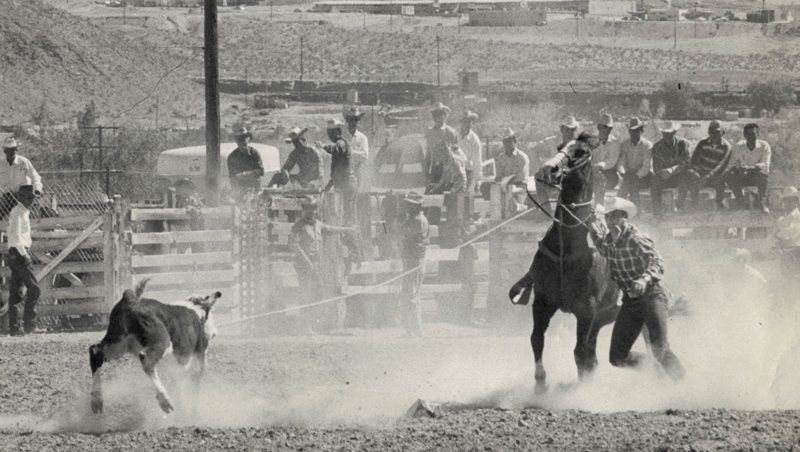Lots of kids grow up aspiring to be a cowboy or a police officer, but only some accomplish that feat. And even less manage to do both. Bob Wiley is the exception to that rule.
Long before Bob Wiley was able to fulfill his childhood dreams, he was learning fundamental life lessons while running track and playing football for Kingsburg High School in central California. The Fresno County Swedish village is now home to just over 10,000 residents. It was and is a small, quiet town by California standards.
Back in the 1950s, Wiley was a star athlete alongside his classmate Rafer Johnson who would go on to win Olympic gold as a decathlete in 1960. Standing an inch over 6-foot, Wiley was the right hand running back to Johnson’s left when the pair played for the Kingsburg Vikings.
“We won our division in both football and track my senior year,” Wiley said who is now 85 years old and lives just 30 miles down the road from where he was born and raised. “Porterville College had a real strong football program. They recruited me to play for them out of high school. I played football for two years there and that’s where I met my wife, Sonja, because she’s from Porterville.”
Cowboy Town
When Porterville College was still trying to entice Wiley to play for them, they had an unknown advantage.
“I went down to Porterville, and discovered it was a Western town,” Wiley said. “People around there had different roping events going on and lots of horse activity. I liked it, so I went to school there.”
The grandson of Swedish immigrants, Wiley grew up on the family farm where he could often be found swamping grapes and peaches. Horses were always part of the landscape, but they certainly weren’t the talented athletes that Wiley would later come to own.
“Some of my earliest memories as a little bitty kid were of my dad and his friends packing into the mountains on horses to go hunting,” he said. “They’d plan for months, and I could hardly wait to go.”
Always interested in horses and roping, Wiley watched people rope any chance he got. At the impressionable age of 15, he was introduced to calf roping for the first time and decided that’s what he wanted to do.
“A friend of mine taught me how to tie and that’s how it really started,” Wiley said. “I bought a horse for $85 and a calf for $15. I didn’t have an arena to rope in, so I just chased that calf around a little pen at home. I essentially taught myself how to rope by doing that.”
High school athletics took a lot of Wiley’s time, but roping was always in the back of his mind. He found his groove in college and rodeo took center stage.
A New Cowboy in Town
“When I got out of college I started working right away and I’d practice roping until 9 at night, then go inside to eat, head to bed and do it all over again the next day,” Wiley explained. “Then I’d rope all day on Saturday and Sunday.”
For most of Wiley’s roping career he was working part-time as a deputy in Porterville while traveling the countryside to rodeo.
“I’d practice in the early hours of the morning until about 4 when I’d go home to put on my uniform and go to work,” Wiley said. “I’d come home around 3 and sleep for a few hours before doing it all again. That was usually my schedule Monday through Wednesday and then the rest of the week I was getting ready for a rodeo and traveling.”
“I finally started getting good and winning a little,” Wiley said. “It wasn’t until 1961 that I was good enough to do it full time.”
That same year Wiley qualified for his first National Finals Rodeo in Dallas. They moved to the L.A. Sports Arena the following year before heading to Oklahoma City in 1965. He’d compete in five NFRs in total, all in consecutive years and in all three locations.
In 1963, Wiley was the reserve world champion behind one of the greatest calf ropers of all time, Dean Oliver, who was inducted into the PRCA Hall of Fame in 1979.
There were plenty of times when Wiley was gone for a month or more at a time. Wiley’s wife and kids spent a lot of time on the rodeo trail right alongside him in the first few years.
Their oldest daughter, Andrea, was born in 1959, followed closely by Acia in 1962 and later Robert in 1967. When the kids started school, their time on the road dwindled. Especially in 1963 when Wiley was making his strongest run at the NFR.
A Gold Buckle Career
“I got started early that year, probably in March, and I was roping pretty good,” Wiley said. “I had a good horse that year too. It all started in Springville, which was kind of a hometown rodeo for me. I won that and I just kept on winning.”
Wiley headed east for the summer so he could hit some of the biggest venues in pro rodeo: Calgary, Cheyenne, Great Falls, Saint Paul, Burwell, Bozeman, and Billings before heading back west for Salt Lake, Ogden, Eureka and Klamath Falls.
“If you’re going to rodeo and try to win something for the year, you have to go to all the big rodeos,” Wiley said. “When you went like I did in ‘63, it’s hard for little kids to be in the car all the time like I was.”
Even though Wiley loved roping competitively for himself, teaching people the finer details of the event became one of his many passions in life. Throughout the 60s he put on multiple calf roping schools for both tie-down and breakaway roping.
“I had quite a few students over the years, but I never charged more than enough to cover the cost of the calves,” Wiley said. “I was mostly doing it to pass my own time really. I liked teaching them how to do it and it kept me involved in the sport when I wasn’t roping myself.”
In 1965, Wiley made his last run at the finals. He didn’t know it initially, but his life was destined for a career outside the arena.
He started that year out strong and won enough to keep him in the top 15, but he was preoccupied to say the least.
A Golden Badge Life
“I got the idea that I wanted to be sheriff and after I announced my candidacy, I campaigned for 22 months,” Wiley said. “I was in full-bore campaign mode, so I wasn’t practicing or competing at all by the fall of ’65.”
Early success in the spring kept Wiley in seventh heading into the finals. He shut the campaign down for a week to compete in Oklahoma City for the first and last time.
“Before the finals my wife and I flew to Amarillo to see my friend Lee Cockrel to ride with him up to the finals,” Wiley said. “Lee took an extra horse for me because I hadn’t ridden my horse in a few months. I won just enough at the finals to pay for the trip there.”
Even though this wouldn’t be Wiley’s last time in the arena, it was his final year as a full-time professional calf roper. As soon as he got back to California, Wiley picked up the campaign trail right where he left it.
In November 1966, Wiley was elected Tulare County Sheriff where he would serve his community for 24 years and win a total of seven elections.
“When I took office in January, I was only 30 years old,” Wiley said. “As a kid, I was always interested in policemen and my family had several law enforcement members that would come and visit us. It was always interesting to me.”
Just like every endeavor before, Wiley put his full weight into being sheriff. He changed the face of the Tulare County Sheriff’s Department, which transcended into revolutionizing jail training programs.
A Life of Discipline
When Wiley first decided to throw his hat into the ring for sheriff, the department was doing the bare minimum. Most notably, it wasn’t taking care of its employees the way Wiley thought they should.
“It was one of the lowest paid operations in the state that didn’t offer any overtime pay, no uniform allowances, and no retirement plans,” Wiley said. “It was tough at first, but I had a lot of good ideas. I knew I wanted to work in the schools with the young people to get a handle on the drug problems.”
It all started when Wiley placed deputies in schools and created educational programs to teach kids about the dangers of drug use. They even introduced kids to ammo, grenades and dynamite so they would know what they are and that they shouldn’t mess with them.
It was a novel approach to a rapidly growing problem. First illustrated by his roping schools, Wiley enjoyed teaching people new things and improving efficiency any chance he got.
“Lots of people copied our school educational programs,” Wiley said. “I also developed a jailer training program that was recognized by the Department of Justice. I went to several jail training programs, and their trainers had never worked in jails. I didn’t like that, so my staff and I developed our own program.”
It shouldn’t be surprising that Wiley made his way inside the jail houses and left his mark there as well. He helped remodel some and build a brand new one. In 1987, his work in the county was commemorated in Visalia when the jail was named the Bob Wiley Detention Facility.
Wiley’s time as a sheriff is a testament to his upbringing. The order and efficiency he instilled in his department kept the cogs running smoothly for a long, effective career.
“My mom was real particular about not abusing people; not making fun of anyone for any reason and not making snide remarks,” Wiley said. “There’s a lot of people that make a habit out of pushing people around and whenever I found out about that, I put a stop to it.”
Over his career, Wiley implemented two narcotic units in his department, solved multiple homicide cases, found lost children and was one of the first to have a K-9 unit. By his retirement in 1991, Wiley was the senior officer of the 58 county sheriffs in California.
A Cowboy at Heart
Getting back to his cowboy boots and roots, Wiley and his wife traveled the country following the NSPRA schedule for a few years. Even competing in Canada at one point.
“At the time, I didn’t have a great horse to rope on, they had gotten really scarce and thus very expensive,” Wiley said.
Dabbling in roping schools for a few more years helped Wiley pass the time before the turn of the century. By then, roping and riding was becoming increasingly difficult.
“The last time I roped was in 2003 and it hurt to come out of the box and to get off,” Wiley said. “I got crippled in the hips and it made it hard to move the way I needed to for calf roping.”
Even though Wiley officially hung his hat up from roping and teaching almost 20 years ago, rodeo is never far from his mind.
“I was lucky that I won quite a bit of money roping,” Wiley said. “I had a good life, and I was young and sound when I needed to be.”









